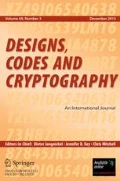Abstract
The first author recently proved the extension theorem for linear codes over integer residue rings equipped with the Lee or the Euclidean weight by introducing a determinant criterion that is dual to earlier approaches. In this paper we generalize his techniques to the context of linear codes over an alphabet that is a finite pseudo-injective module with a cyclic socle and is equipped with an arbitrary weight. The main theorem is a criterion for the weight to have the extension property.

Similar content being viewed by others
References
Arf C.: Untersuchungen über quadratische Formen in Körpern der Charakteristik \(2\). I. J. Reine Angew. Math. 183, 148–167 (1941). https://doi.org/10.1515/crll.1941.183.148.
Barra A., Gluesing-Luerssen H.: MacWilliams extension theorems and the local-global property for codes over Frobenius rings. J. Pure Appl. Algebra 219(4), 703–728 (2015). https://doi.org/10.1016/j.jpaa.2014.04.026.
Bogart K., Goldberg D., Gordon J.: An elementary proof of the MacWilliams theorem on equivalence of codes. Inf. Control 37(1), 19–22 (1978).
Constantinescu I.: Lineare Codes über Restklassringen ganzer Zahlen und ihre Automorphismen bezüglich einer verallgemeinerten Hamming-Metrik. Ph.D. thesis, Techniche Universität München, München (1995).
Constantinescu I., Heise W.: A metric for codes over residue class rings of integers. Probl. Peredachi Inf. 33(3), 22–28 (1997).
Dinh H.Q., López-Permouth S.R.: On the equivalence of codes over finite rings. Appl. Algebra Eng. Commun. Comput. 15(1), 37–50 (2004). https://doi.org/10.1007/s00200-004-0149-5.
Dinh H.Q., López-Permouth S.R.: On the equivalence of codes over rings and modules. Finite Fields Appl. 10(4), 615–625 (2004). https://doi.org/10.1016/j.ffa.2004.01.001.
Dyshko S.: Geometric approach to the MacWilliams extension theorem for codes over module alphabets. Appl. Algebra Eng. Commun. Comput. 28(4), 295–309 (2017). https://doi.org/10.1007/s00200-017-0324-0.
Dyshko S.: When the extension property does not hold. J. Algebra Appl. 16(5), 1750098 (2017). https://doi.org/10.1142/S0219498817500980.
Dyshko S.: The extension theorem for Lee and Euclidean weight codes over integer residue rings. Des. Codes Cryptogr. 87(6), 1253–1269 (2019). https://doi.org/10.1007/s10623-018-0521-2.
ElGarem N., Megahed N., Wood J.A.: The extension theorem with respect to symmetrized weight compositions. In: ElGarem N. (ed.) Coding Theory and Applications, CIM Series in Mathematical Science, vol. 3, p. 177. Springer, Cham (2015).
Gnilke O.W., Greferath M., Honold T., Wood J.A., Zumbrägel J.: The extension theorem for bi-invariant weights over Frobenius rings and Frobenius bimodules. In: Leroy A., Lomp C., López-Permouth S., Oggier F. (eds.) Rings, Modules and Codes, Contemporary Mathematics, vol. 727, pp. 117–129. American Mathematical Society, Providence (2019). https://doi.org/10.1090/conm/727/14629.
Goldberg D.Y.: A generalized weight for linear codes and a Witt-MacWilliams theorem. J. Comb. Theory Ser. A 29(3), 363–367 (1980). https://doi.org/10.1016/0097-3165(80)90032-1.
Greferath M.: Orthogonality matrices for modules over finite Frobenius rings and MacWilliams’ equivalence theorem. Finite Fields Appl. 8(3), 323–331 (2002). https://doi.org/10.1006/ffta.2001.0343.
Greferath M., Schmidt S.E.: Finite-ring combinatorics and MacWilliams’s equivalence theorem. J. Comb. Theory Ser. A 92(1), 17–28 (2000). https://doi.org/10.1006/jcta.1999.3033.
Greferath M., Nechaev A., Wisbauer R.: Finite quasi-Frobenius modules and linear codes. J. Algebra Appl. 3(3), 247–272 (2004). https://doi.org/10.1142/S0219498804000873.
Greferath M., Mc Fadden C., Zumbrägel J.: Characteristics of invariant weights related to code equivalence over rings. Des. Codes Cryptogr. 66(1–3), 145–156 (2013). https://doi.org/10.1007/s10623-012-9671-9.
Greferath M., Honold T., Mc Fadden C., Wood J.A., Zumbrägel J.: MacWilliams’ extension theorem for bi-invariant weights over finite principal ideal rings. J. Comb. Theory Ser. A 125, 177–193 (2014). https://doi.org/10.1016/j.jcta.2014.03.005.
Hammons A.R. Jr., Kumar P.V., Calderbank A.R., Sloane N.J.A., Solé P.: The \({\mathbb{Z}}_4\)-linearity of Kerdock, Preparata, Goethals, and related codes. IEEE Trans. Inf. Theory 40(2), 301–319 (1994). https://doi.org/10.1109/18.312154.
Kurakin V.L., Kuzmin A.S., Markov V.T., Mikhalev A.V., Nechaev A.A.: Linear codes and polylinear recurrences over finite rings and modules (a survey). In: Fossorier M., Imai H., Lin S., Poli A. (eds.) Applied Algebra, Algebraic Algorithms and Error-Correcting Codes (Honolulu, HI, 1999), Lecture Notes in Computer Science, vol. 1719, pp. 365–391. Springer, Berlin (1999). https://doi.org/10.1007/3-540-46796-3_36.
MacWilliams F.J.: Error-correcting codes for multiple-level transmission. Bell Syst. Tech. J. 40, 281–308 (1961). https://doi.org/10.1002/j.1538-7305.1961.tb03986.x.
MacWilliams F.J.: Combinatorial Problems of Elementary Abelian Groups. ProQuest LLC, Ann Arbor (1962). Thesis (Ph.D.)–Radcliffe College. http://gateway.proquest.com/openurl?url_ver=Z39.88-2004&rft_val_fmt=info:ofi/fmt:kev:mtx:dissertation&res_dat=xri:pqdiss&rft_dat=xri:pqdiss:0260595
Ward H.N., Wood J.A.: Characters and the equivalence of codes. J. Comb. Theory Ser. A 73(2), 348–352 (1996).
Witt E.: Theorie der quadratischen Formen in beliebigen Körpern. J. Reine Angew. Math. 176, 31–44 (1937). https://doi.org/10.1515/crll.1937.176.31.
Wood J.A.: Witt’s extension theorem for mod four valued quadratic forms. Trans. Am. Math. Soc. 336(1), 445–461 (1993). https://doi.org/10.2307/2154354.
Wood J.A.: Extension theorems for linear codes over finite rings. In: Applied Algebra, Algebraic Algorithms and Error-Correcting Codes (Toulouse, 1997), Lecture Notes in Computer Science, vol. 1255, pp. 329–340. Springer, Berlin (1997)
Wood J.A.: Duality for modules over finite rings and applications to coding theory. Am. J. Math. 121(3), 555–575 (1999).
Wood J.A.: Weight functions and the extension theorem for linear codes over finite rings. In: Mullen G.L., Shiue P.J.-S. (eds.) Finite Fields: Theory, Applications, and Algorithms (Waterloo, ON, 1997), Contemporary Mathematics, vol. 225, pp. 231–243. American Mathematical Society, Providence (1999). https://doi.org/10.1090/conm/225/03225.
Wood J.A.: Code equivalence characterizes finite Frobenius rings. Proc. Am. Math. Soc. 136(2), 699–706 (2008). https://doi.org/10.1090/S0002-9939-07-09164-2.
Wood J.A.: Foundations of linear codes defined over finite modules: the extension theorem and the MacWilliams identities. In: Solé P. (ed.) Codes Over Rings (Ankara, 2008), Series Coding Theory Cryptology, vol. 6, pp. 124–190. World Science Publishing, Hackensack (2009). https://doi.org/10.1142/9789812837691_0004.
Wood J.A.: Two approaches to the extension problem for arbitrary weights over finite module alphabets. Appl. Algebra Eng. Commun. Comput. (2020). https://doi.org/10.1007/s00200-020-00465-5.
Author information
Authors and Affiliations
Corresponding author
Additional information
In memoriam: Vera Pless, 1931–2020.
Publisher's Note
Springer Nature remains neutral with regard to jurisdictional claims in published maps and institutional affiliations.
This is one of several papers published in Designs, Codes and Cryptography comprising the “Special Issue: On Coding Theory and Combinatorics: In Memory of Vera Pless”
Rights and permissions
About this article
Cite this article
Dyshko, S., Wood, J.A. MacWilliams extension property for arbitrary weights on linear codes over module alphabets. Des. Codes Cryptogr. 90, 2683–2701 (2022). https://doi.org/10.1007/s10623-021-00945-w
Received:
Revised:
Accepted:
Published:
Issue Date:
DOI: https://doi.org/10.1007/s10623-021-00945-w




